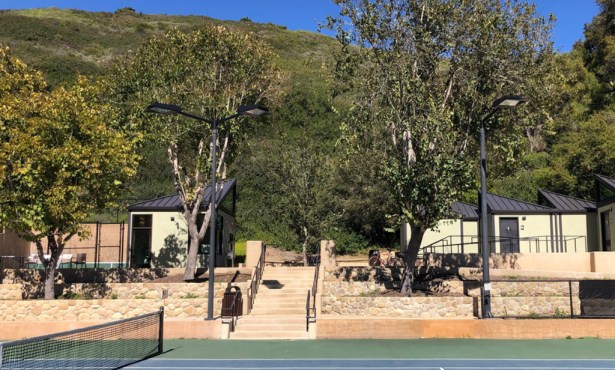A Memoir
Loving Music for a Living
By Gerald Carpenter
We arrived in Santa Barbara, with two cats and all our earthly
belongings, on October 20, 1984. The more significant of our cats
was Duncan, a wise and confident Tonkinese, coffee-colored with
dark points, who lived another 10 years to the ripe age of 18. The
other cat was Wally, a beautiful but dim-witted black-and-white
who, a few months later, found his way to a coyote’s dinner
table.
In January 1985, we moved into the house in Ellwood where we
would spend the next 21-plus years. There was a Chow named Chad and
a black cat named Taz already living in the house, and we willingly
absorbed them into our family. The house was Heaven on Earth, for
us and for all our animals.
 When we arrived, I had been writing
When we arrived, I had been writing
professionally for five years. Within a month I was getting my work
published in Randy Campbell’s Santa Barbara Weekly, which he had
just converted from the monthly Nightlight. I hadn’t yet developed
a special field, though as I recall one of the first things I wrote
was a review of Die Fledermaus. I loathed it, but as was soon to
become my rule, I praised the production and trashed the work. I
also spoke disparagingly of the musical blockheadedness of the
Viennese, and provoked an angry letter from the local
representative of the Vienna Chamber of Commerce. I wanted to
review movies, of course, because everybody reads film reviews and,
like any writer, I want to be read.
I have now reviewed many hundreds of movies, for the Weekly and,
after it merged with the Marianne Partridge’s News and Review to
form the still thriving Santa Barbara Independent, for that
publication. Eventually, as a means of becoming a permanent
contributor to The Independent, I hit upon the subject of classical
music. I was not myself a classical musician, but I have always
listened to it and read about it, and I had accumulated a deep
background for writing about it. For my first 17 years, I divided
my musical passions between classical and folk. Then came the
Beatles, and for the next decade or so, rock was the dominant music
in my life. However, I never stopped listening to classical music,
but it ceased to be an experience shared with most of my
friends.
One day in 1976, I was standing in line at the Troubadour in
West Hollywood, holding a ticket to hear John David Souther, who
had just come out with his masterpiece Black Rose (“Oh, the night
is a river / where the lonely are drowned”). I looked up and down
the line and noticed that I seemed to have 10 years on the next
oldest person. I thought of the Noel Coward saying, “Those over 40,
who try very hard to be ‘with it,’ soon find out they are ‘without
it.’” I was just 30, but I was already there. I got a refund on my
ticket and drove back to San Diego.
Living in rural Michigan from 1977-1984, I rediscovered
classical music. I could get three NPR stations, and in those days,
NPR was mostly music, not talk. There were many regular broadcasts
of live performances. I got into listening to them, taping them,
and listening to the tapes over and over. With a surge of joy, I
understood that classical music was something I would never
outgrow, and certainly never come to the end of.
Passing the Lobero Theatre in summer 1985, I saw a notice that
an organization called the Music Academy of the West was going to
offer an orchestral concert. One of the works on the program, to be
conducted by Lawrence Leighton Smith, was Brahms’s Symphony No. 4.
I find most of Brahms’s orchestral scores to be oppressive, but not
this one, and since my wife also likes the work, I bought tickets.
As far as I could see, the musicians were all just kids, but the
minute they started to play, they turned into passionate and
disciplined masters. I was swept away. If I had been more familiar
with The Tempest then, I might have cried out: “O brave new world,
that has such persons in it!” As it was, I was more apt to cite The
Buffalo Springfield: “There’s something happening here!”
As a general rule, classical music and popular music don’t mix.
Put to a vote, popular music will always be elected. To pretend
otherwise is to court heartache and frustration. It will remain a
minority taste, but it need not submit to the tyranny of the
majority. Neil Postman once observed that one doesn’t get any
better at watching television the more one does it. The same is
true of listening to popular music, but not of listening to
classical music. Some classical music can be passively heard and
enjoyed, but active listening is better. In any case, and in
whatever degree your mind is engaged, classical music must be heard
with emotion.
Quite early in my writing about classical music, I wrote a
preview of a Santa Barbara Symphony concert in which Varujan Kojian
was conducting Mahler’s Symphony No. 2, “Resurrection.” My approach
was entirely subjective. Apparently, it struck a chord. The
symphony’s Barbara Burger wrote to The Independent’s editors to say
that ticket sales had made a quantum leap after my article had
appeared. Best of all, those who had been moved to attend the
symphony, perhaps for the first time, were treated to an
overwhelming musical experience. Kojian was a master of those huge
romantic scores, and his reading of the “Resurrection” was as
powerful and true as any I have ever heard.
Throughout the years, as I had scarcely dared hope, my column,
Music Lovers (named for the Ken Russell film), became something of
a unifying force in Santa Barbara’s classical music community.
After almost 20 years, it would be unfair, not to mention
impossible, to single out a top five concerts or any such thing.
Writing it has been one continuous joy, and what I owe our local
musicians I can never repay. Thank you, and so long — for now.
editor’s note: Gerald Carpenter will always be a VIP here at The
Independent, and readers can expect that, just as he may be
returning to Santa Barbara from time to time as a visitor, so too
his writing will make guest appearances in our pages. From all of
us to you, Gerald, many thanks for your years of service, insight,
and dedication.


